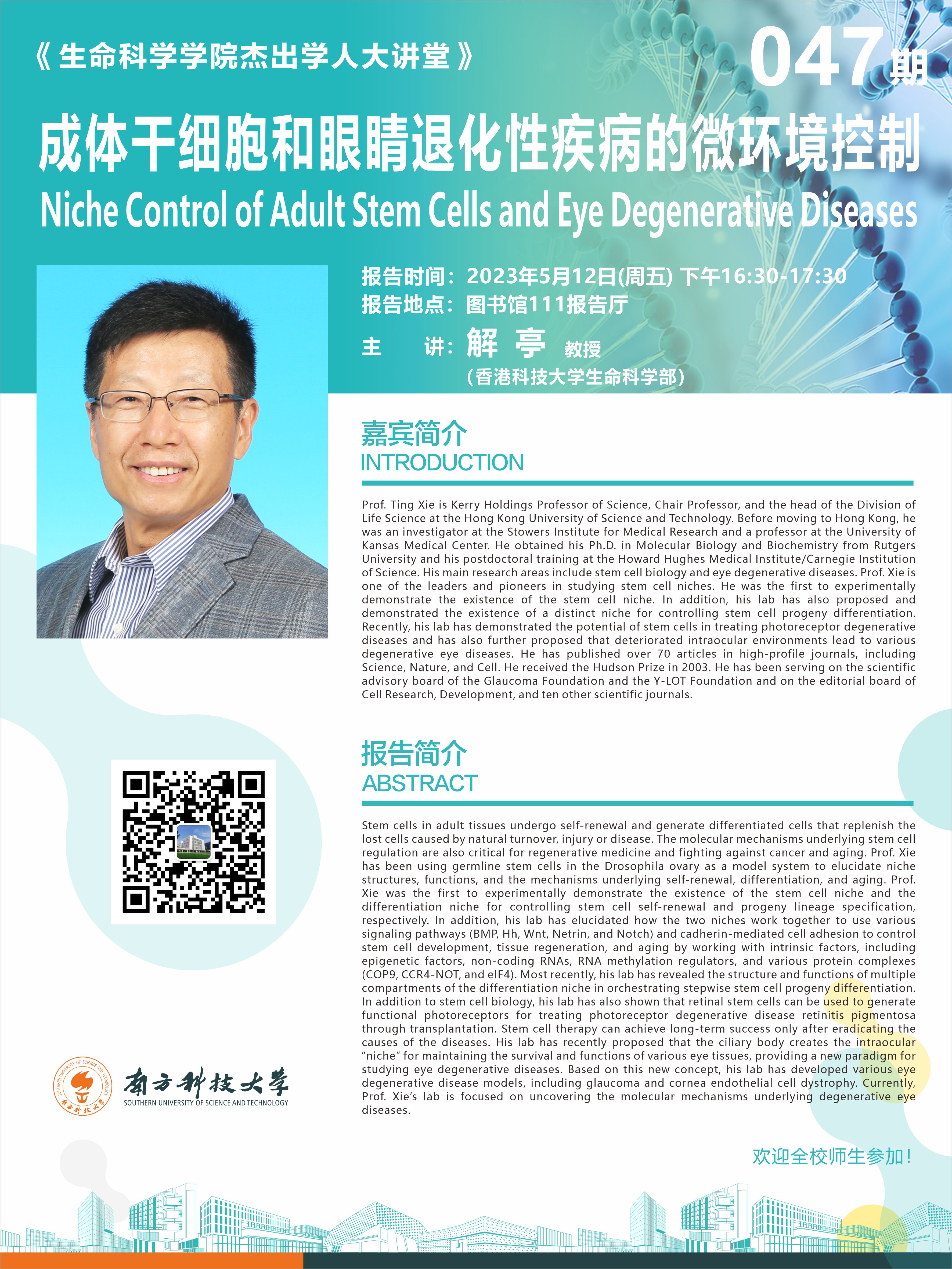
主讲人: 解亭 教授
时间: 2023年5月12日16:30-17:30
地点: 琳恩图书馆111报告厅
题 目:成体干细胞和眼睛退化性疾病的微环境控制
主 讲:解亭 教授
时 间:2023年5月12日16:30-17:30
地 点:琳恩图书馆111报告厅
报告摘要:
Stem cells in adult tissues undergo self-renewal and generate differentiated cells that replenish the lost cells caused by natural turnover, injury or disease. The molecular mechanisms underlying stem cell regulation are also critical for regenerative medicine and fighting against cancer and aging. Prof. Xie has been using germline stem cells in the Drosophila ovary as a model system to elucidate niche structures, functions, and the mechanisms underlying self-renewal, differentiation, and aging. Prof. Xie was the first to experimentally demonstrate the existence of the stem cell niche and the differentiation niche for controlling stem cell self-renewal and progeny lineage specification, respectively. In addition, his lab has elucidated how the two niches work together to use various signaling pathways (BMP, Hh, Wnt, Netrin, and Notch) and cadherin-mediated cell adhesion to control stem cell development, tissue regeneration, and aging by working with intrinsic factors, including epigenetic factors, non-coding RNAs, RNA methylation regulators, and various protein complexes (COP9, CCR4-NOT, and eIF4). Most recently, his lab has revealed the structure and functions of multiple compartments of the differentiation niche in orchestrating stepwise stem cell progeny differentiation. In addition to stem cell biology, his lab has also shown that retinal stem cells can be used to generate functional photoreceptors for treating photoreceptor degenerative disease retinitis pigmentosa through transplantation. Stem cell therapy can achieve long-term success only after eradicating the causes of the diseases. His lab has recently proposed that the ciliary body creates the intraocular “niche” for maintaining the survival and functions of various eye tissues, providing a new paradigm for studying eye degenerative diseases. Based on this new concept, his lab has developed various eye degenerative disease models, including glaucoma and cornea endothelial cell dystrophy. Currently, Prof. Xie’s lab is focused on uncovering the molecular mechanisms underlying degenerative eye diseases.
嘉宾简介:
Prof. Ting Xie is Kerry Holdings Professor of Science, Chair Professor, and the head of the Division of Life Science at the Hong Kong University of Science and Technology. Before moving to Hong Kong, he was an investigator at the Stowers Institute for Medical Research and a professor at the University of Kansas Medical Center. He obtained his Ph.D. in Molecular Biology and Biochemistry from Rutgers University and his postdoctoral training at the Howard Hughes Medical Institute/Carnegie Institution of Science. His main research areas include stem cell biology and eye degenerative diseases. Prof. Xie is one of the leaders and pioneers in studying stem cell niches. He was the first to experimentally demonstrate the existence of the stem cell niche. In addition, his lab has also proposed and demonstrated the existence of a distinct niche for controlling stem cell progeny differentiation. Recently, his lab has demonstrated the potential of stem cells in treating photoreceptor degenerative diseases and has also further proposed that deteriorated intraocular environments lead to various degenerative eye diseases. He has published over 70 articles in high-profile journals, including Science, Nature, and Cell. He received the Hudson Prize in 2003. He has been serving on the scientific advisory board of the Glaucoma Foundation and the Y-LOT Foundation and on the editorial board of Cell Research, Development, and ten other scientific journals.